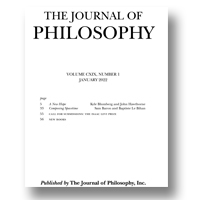|
1.
|
The Journal of Philosophy:
Volume >
114 >
Issue: 5
Trenton Merricks
Locating Vagueness
abstract |
view |
rights & permissions
| cited by
The claim that all vagueness must be a feature of language or thought is the current orthodoxy. This is a claim about the “location” of vagueness. “Locating Vagueness” argues that this claim is false, largely by defending the possibility of borderline cases in the absence of language and thought. If the orthodoxy about the location of vagueness is false, then so too is any account of the “nature” of vagueness that implies that orthodoxy. So this paper concludes that various accounts of the nature of vagueness are false. Among such accounts, so this paper argues, are the standard versions of supervaluationism and the standard versions of epistemicism. So I conclude that those accounts are false. Along the way, I present, and uncover ways to motivate, several heretical accounts of the nature of vagueness, including nonstandard versions of both supervaluationism and epistemicism.
|
|
|
2.
|
The Journal of Philosophy:
Volume >
114 >
Issue: 5
Nevin Climenhaga
Inference to the Best Explanation Made Incoherent
abstract |
view |
rights & permissions
| cited by
Defenders of Inference to the Best Explanation (IBE) claim that explanatory factors should play an important role in empirical inference. They disagree, however, about how exactly to formulate this role. In particular, they disagree about whether to formulate IBE as an inference rule for full beliefs or for degrees of belief, as well as how a rule for degrees of belief should relate to Bayesianism. In this essay I advance a new argument against non-Bayesian versions of IBE. My argument focuses on cases in which we are concerned with multiple levels of explanation of some phenomenon. I show that in many such cases, following IBE as an inference rule for full beliefs leads to deductively inconsistent beliefs, and following IBE as a non-Bayesian updating rule for degrees of belief leads to (synchronically) probabilistically incoherent degrees of belief.
|
|
